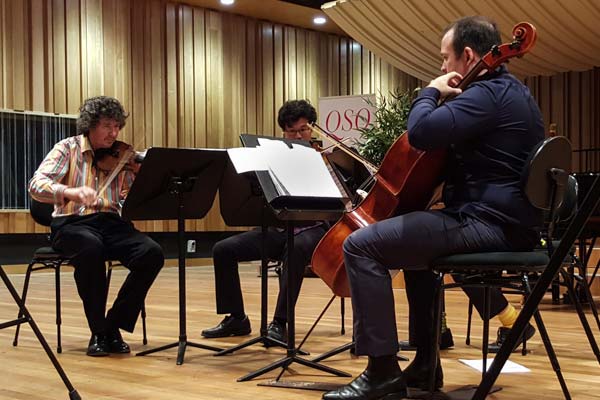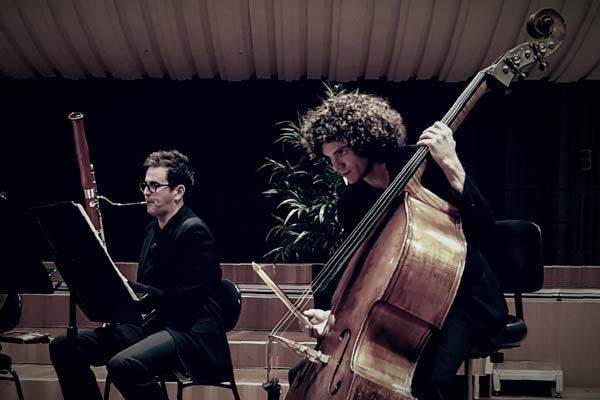“My plea for modern music is not that we should like it, nor necessarily that we should even understand it, but that we should exhibit it as a significant human document.”
These intriguing words are from Mrs Elizabeth Spraque Coolidge, who commissioned Bartók to write String Quartet No.5. Bartók has always divided opinion, and this piece divided ours! Although occasionally obscure, and some may even say “anchorless”, it is also arresting, and occasionally captivating – there is an engaging jazzy sound in the third movement, and we were fascinated (and somewhat startled!) by the apparent musical equivalent of car-horns blaring and sirens wailing, sounds that must have been relatively novel to the composer in the 1930s when this was written. Another notable feature was the prominent use of spiccato bowing, and there were moments of musical drama that gave us goosebumps! What is not in dispute is that this very challenging piece was expertly played – attested to by the fleeting look of joy and relief that passed over Warwick Adeney’s face at its conclusion – and that is that this is indeed an important piece of 20th century music, as per the intention of its patron.
 © Karen Hutt
© Karen HuttWe were privileged to enjoy the premiere of Bernard Hoey’s quintet Quod scripsi, scripsi – literally ‘What I have written, I have written’, a reference to Pontius Pilate’s declaration at the crucifixion – a more apposite translation in keeping with Bernard Hoey’s tongue-in-cheek programme notes might be: ‘It is what it is’! This was a thoroughly enjoyable piece of music, in 6 contiguous sections. At times reminiscent of John Adams’ work, repeating rhythms are augmented by a slight but insistent dissonance that drives the piece forward, constantly seeking resolution.
The programme concluded with headline piece Appalachian Spring. As with Bartók’s String Quartet No. 5, this was also commissioned by Elizabeth Spraque Coolidge – this sublime orchestral suite is justifiably one of the 20th century’s best-loved pieces of chamber music. The score was written for a ballet, and tells the story of a pioneer wedding and marriage in the Pennsylvania hill country in the early 1800s.
 © Karen Hutt
© Karen HuttThe very familiar theme from the seventh section is taken from a Shaker hymn, ‘Simple Gifts’; many of us will recognise the tune as being the source for Sydney Carter’s later hymn ‘Lord of the Dance’. With exquisite melodies, the piece wends its way through the spectrum of emotions, hopes and fears of a young couple, ultimately evoking a sense of peace, harmony and simplicity. The hauntingly beautiful notes from the flute and clarinet brought tears to the eyes of many. Peter Luff conducted unobtrusively, allowing the music to speak for itself.
The Chamber Players’ series is designed to bring performers and audience closer together, and the QSO studio venue certainly allows for this, with an absence of stage, and orchestra members literally within arm’s reach of the front audience row. This makes for a very different and more intimate feel, more closely aligned, one suspects, to the original intent of “chamber” music.
The QSO Musicians host two more shows at their Southbank Studio this year.
Béla Bartók—String Quartet No.5, BB 110
Bernard Hoey—Quod scripsi, scripsi (2016)
Aaron Copland—Appalachian Spring Suite (1944)

